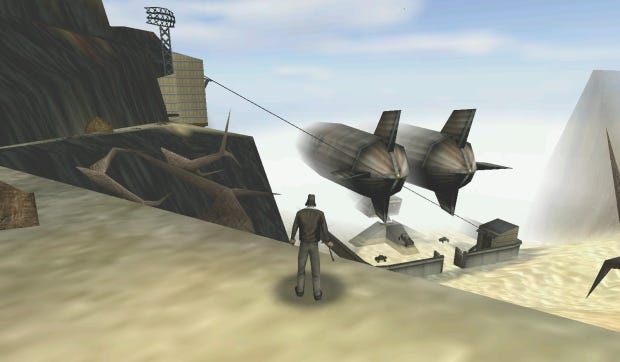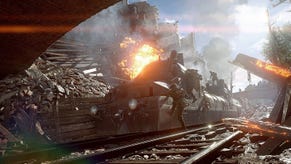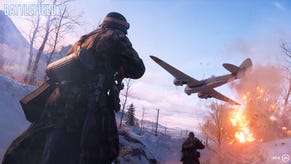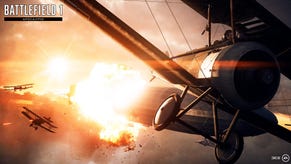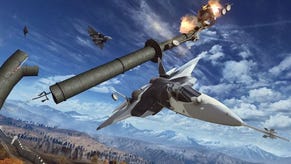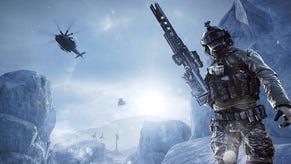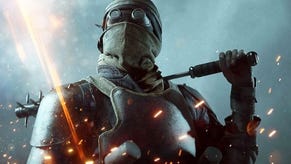Codename Eagle: Reflections On The Real Battlefield 1
Bald but golden
Charlie Brooker and an atrocious Bust-a-Move port was all that stood between Codename: Eagle and dubious distinction in the bumper Christmas 1999 edition of PC Zone. If it hadn't been for Puzzle Bobble 2 and Mr Brooker's merciless demolition of it (“Pay money for this abysmal conversion and you may as well phone up the publishers and ask them to come round and piss in your eyes.”) the game that inadvertently spawned the Battlefield franchise would have received the issue's lowest rating - 45%. Spooked by that score, it's taken me sixteen years to get around to trying Refraction's conveyance-crammed FPS. After a weekend of biplane trashing, airship hijacking, and wolf stabbing I now understand why Zone described CE as “a game of missed opportunities”. I also understand why the blood-spattered Battlefield 1 trailer isn't aquiline enough for some.
Codename: Eagle dodged insensitivity accusations by treating WWI as a flea market rather than a theme park. Just about the only useful thing potential purchasers could learn from the staggeringly unhelpful print ads that accompanied the low-key release was that the game was set in a parallel universe where European peace was threatened by a warmongering Russian Tsar rather than a warmongering German Kaiser.
The smudged setting left the Swedish devs free to fool about with interesting early 20th Century tech such as airships, biplanes, machine guns, and tanks, confident that thoughtful commentators wouldn't spend half their previews or reviews pillorying them for trivialising tragedy or distorting popular perceptions. Those discordant Rupert Brooke and Wilfred Owen load-screen quotes – that dutiful All Quiet on the Western Front-referencing cutscene with the barbed wire and the butterfly - all unnecessary thanks to a tasteful sidestep into alternate history.
I like the fact that I can play CE without wondering whether my great-grandfather - one of the hundreds of thousands lost without trace on the Western Front - would think less of me for playing it. At no point does the game award me bonus points or new toys for gleefully bludgeoning an enemy to death with an entrenching tool or a nail-studded club. In fact trench warfare is entirely absent from the twelve story missions.
The closest Refraction's artificers and level designers come to courting controversy is dotting levels with knapsack flamethrowers and poison gas grenade launchers. Even then, dark historical associations are kept at bay by the accompanying environments (checkpoints, factories, airfields, moving trains...) and the absurd Biggles-with-bells-on feel of most of the missions.
If a dam's got to be breached, a defector rescued, a document pinched or a zeppelin deflated, you're the chap with the capacious pockets, talent for commandeering enemy vehicles, and aggravating inability to crouch or lean that 'Shadow Command' invariably send for. There are times when maps and objectives bring to mind Hidden & Dangerous and No One Lives Forever, but CE can't do ambience, audio or AI nearly as well as either of those millennium marvels. Rural environments feel too bare, too angular, enemies too bewildered and self-destructive.
You persevere with the so-so solo gunplay because the sentry-topping is interspersed with entertaining puzzles (Work out a way to deactivate the electric fence. Find vodka to bribe the truck driver. Obtain the key to the compound gate....) and because, at least once every op, there's the opportunity to joyride something wheeled or winged.
Without its stealable AFVs, aerodynes, boats, bikes and trucks Codename: Eagle would have been forgotten faster than the Supermarine's Spitfire's ponderous predecessor or Britain's strangest steam loco. The worst moments in single-player are dismounted encounters with zigzagging wolves and guard dogs; the best, frantic armoured car dashes, bruising tank duels, and hairy biplane escapes. The physics and damage models are just about sophisticated enough to make speeding across undulating terrain interesting and using heavily damaged rides as impromptu guided missiles possible. The joy of the perfectly-timed ejection or miraculous moving vehicle switch was experienced by CE players long before it was known to the Battlefield fraternity.
Until the first patch reined in some of their churlish tendencies, CE aircraft could be uncooperative swines especially when controlled with a mouse. As there are non-negotiable story episodes involving dogfights, bridge attacks, take-offs from cramped airfields, and carrier landings, it's easy to understand why some reviewers lost patience. Scripting bugs and relatively short view ranges didn't help CE make a good first impression either.
In one of the story's most demanding sections, a plane carrying Nicholas II's daughter to safety must be protected from marauding interceptors while flying along a snaking valley. A kinder dev would have given duffers the option of playing the mission from the flak car of an armoured train or the air-gunner's seat of an AI controlled biplane. Refraction insist you go aloft in a light-as-a-feather S.E.5a lookalike with limited ammo and a flea-tiny first-person crosshair.
Sampling CE's massively influential deathmatch, team contests, and capture the flag hasn't been easy since the demise of GameSpy. As with the bug fixes and flight handling improvements, the game's multiplayer renaissance arrived a little too late to influence many of the early review scores. By the time a couple of patches had increased server stability, raised headcounts, and introduced multi-crewing and new vehicles like the zeppelin, destroyer and autogyro, CE's obscurity was all but guaranteed. It would take new investment (Refraction were bought by DICE early in 2000) a more marketable theme, and a snappier title to turn a cult success into a mainstream multi-million pound franchise...
While I'm not surprised that DICE have decided to tackle the Great War head-on in their next undertaking, I am a tad disappointed. Codename: Eagle's alternate history approach wouldn't have impacted the unusual vehicle and weapon chemistry the devs are clearly eager to explore, yet might have prevented the words 'WWI' and 'fun' becoming inextricably linked in the minds of countless impressionable youngsters.
For complicated and not wholly logical reasons the 1914-18 conflict enjoys a special reputation in countries like Britain. It functions as a totem – a constant reminder of the horrendous cost and reality of war. The entertainers and artists that plunder the Great War for plots and characters tend to do so respectfully... sympathetically. I suspect the my adverse reaction to the Battlefield 1 trailer is rooted in fear, fear that one of the very few truly potent anti-war counterweights at work in British society today is under attack from a company happy to put profit generation and punter gratification before social responsibility and respect for the dead. I hope DICE prove me wrong and do something empathetic and genuinely educational with Battlefield 1 but from the way that trailer lingers lovingly on bloody trench-club attacks and swirling mustard gas clouds you'll have to forgive me if I remain sceptical for the time being.
* * * * *
